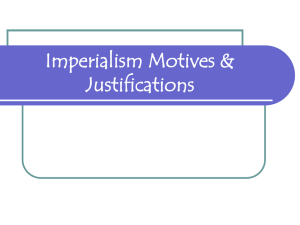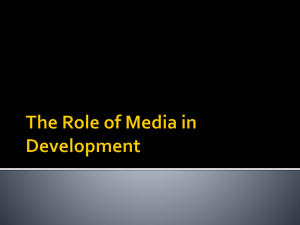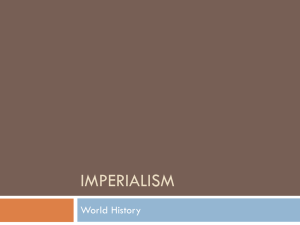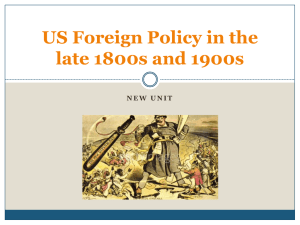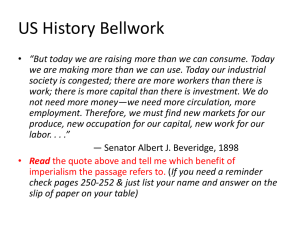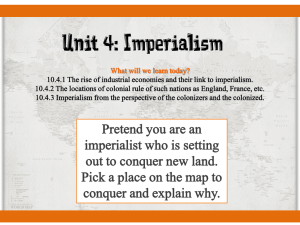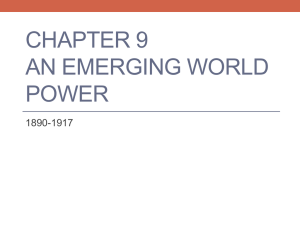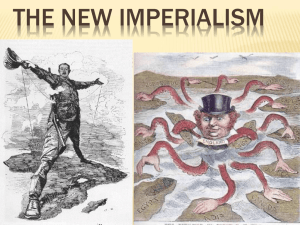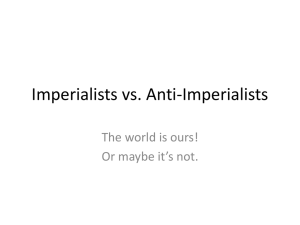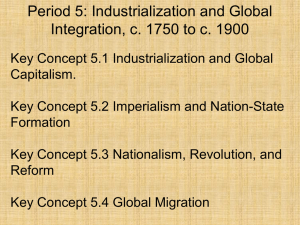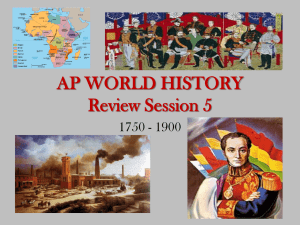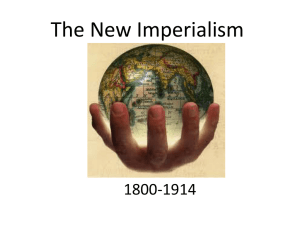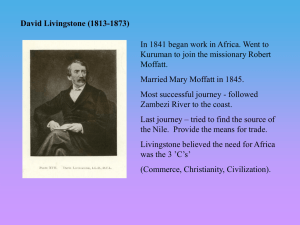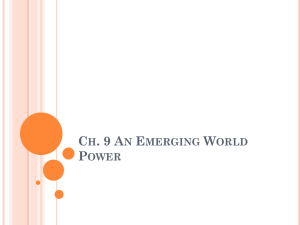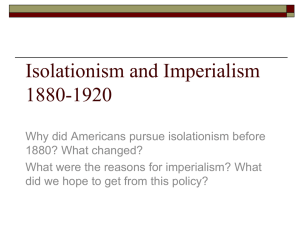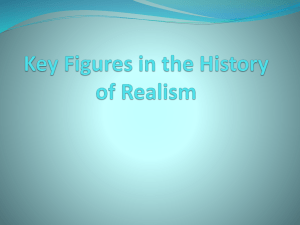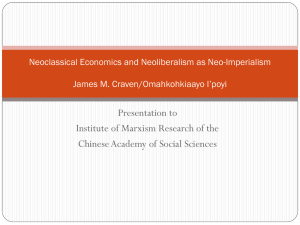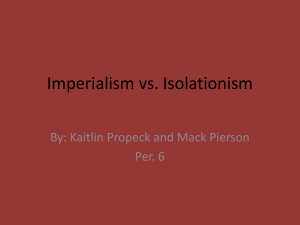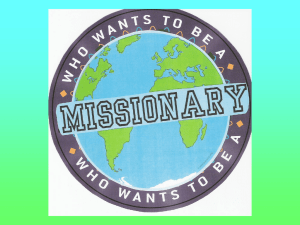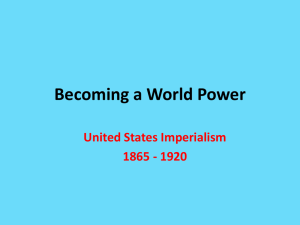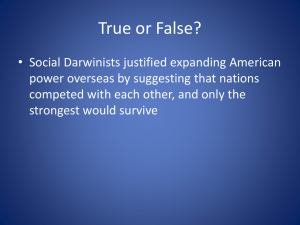Imperialism - A204 Online
advertisement
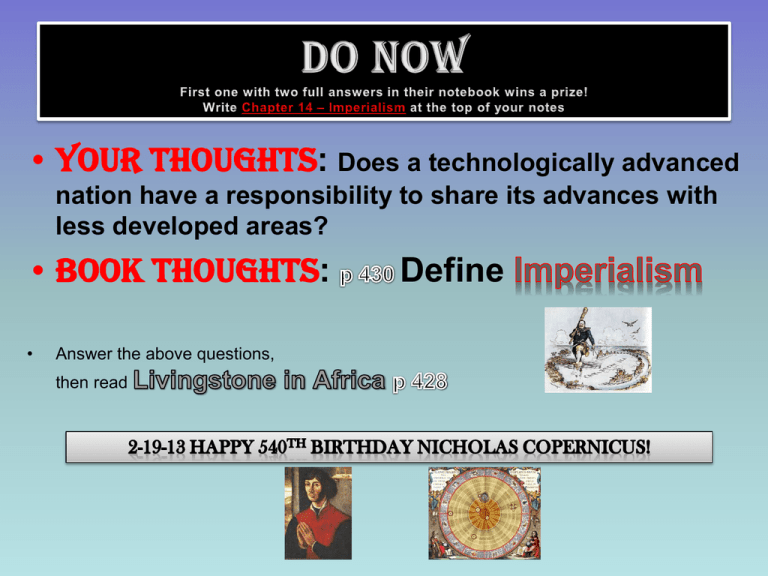
• Your thoughts: Does a technologically advanced nation have a responsibility to share its advances with less developed areas? • Book thoughts: • Answer the above questions, then read Define Livingstone in Africa • How did Livingstone’s description of Africa differ from most people of the time? • How did David Livingstone say Great Britain could bring ‘civilization’ to Africa? • What does this story say about the European attitude towards the rest of the world? • Look at the chart on page 430 – What nations are moving into Africa? – Why do you think there are less nations in Southeast Asia and India? • Look at the map on , What are countries getting out of the “Spice Islands” of Southeast Asia? • Define and ( ) • What colony is the United States trying to acquire during this time period? ( ) • Write 5 words that you think of to describe modern-day Africa: • What is the difference between direct rule and indirect rule? (p 433) What do you notice about Great Britain’s locations? Stanley and Livingstone in Africa Read the National Geographic Special ReportAnswer the following questions 1. What were 2 of Dr. Livingstone’s reasons for exploring Africa? 2. What waterfall did Livingstone encounter on his trip from the interior to the mouth of the Zambezi River? 3. What were the main obstacles that Livingstone faced? Closing Discussion: Is Dr. David Livingstone a Hero or Villain? What did his work produce? What is the impact for Africans as they learn the British language, cultural values and beliefs? What is the impact of learning the British language, cultural values and beliefs on Africans? • British Perspective Africans can speak a language used throughout the British Empire. Africans become part of the great British Empire. Africans become "civilized" and spread British customs and traditions. • African Perspective African culture and heritage may be replaced by British culture and heritage. Many Africans may not be included in society because they do not know the English language. Indigenous peoples will be divided according to whether they follow British customs and traditions or not. A new set of values and beliefs may be created by blending both British and indigenous customs and traditions. • the extension of a • Define Imperialism nation’s power over other lands • Answer • Reading Check Question on page 433 • Take out HW notes Perspective on Europe in Africa Stories: David Livingstone King Leopold II Cecil Rhodes Muhammad Ali Ferdinand Lesseps Muhammad Ahmad Shaka Zulu Two Questions for each: How do these people feel about Imperialism? …What was their perspective? David Livingstone What would he say about European Imperialism in Africa? Why would he think that way? What were his motives? • Favors Imperialism • Religious motivation King Leopold II What would he say about European Imperialism in Africa? • Belgian king • Favors Imperialism • Profit and power Why would he think that way? What were his motives? Cecil Rhodes • British - Favors Imperialism • Motivated by power • Wealthy from gold/diamond trade • Creates “Rhodesia” in S. Africa • “…from the Cape to Cairo” What would he say about European Imperialism in Africa? Why would he think that way? What were his motives? Ferdinand Lesseps What would he say about European Imperialism in Africa? • French Contractor – Suez Canal • Favors Imperialism • Financial gains $$ Why would he think that way? What were his motives? Muhammad Ahmad What would he say about European Imperialism in Africa? Why would he think that way? What were his motives? • Against Imperialism • Launches revolt in Sudan Shaka Zulu What would he say about European Imperialism in Africa? Why would he think that way? What were his motives? • Against Imperialism • Leads Zulu revolt in S. Africa Muhammad Ali What would he say about European Imperialism in Africa? Why would he think that way? What were his motives? • Wants to create independent Egypt • Modernize/”Westernize” through reforms to military, government, etc. Imperialism in Africa By 1900, almost all Africa is under European rule, a. Between 1880 and 1900, nearly all of Africa comes under European powers b. Only Liberia and Ethiopia remain free as paternalistic nations exploit valuable resources a. Key African resources: peanuts, timber, hides, minerals, gold, diamonds b. Key locations: Suez Canal, South Africa and successfully stop any African resistance. a. Muhammad Ali & Egypt b. Zulus in South Africa c. Muhammad Ahmad in Sudan Do Now Europeans have influenced life in India for many years. The first Dutch explorers established trading centers on the coastline and, as the power of the ruling Mughal Empire faded, began to exert more influence on Indian life. Soon, though, the Dutch were replaced by a new colonial power – the British East India Company. This company took a greater role in Indian life, even establishing its own army called the Sepoys. Comprised of Indians, this security force protected the interests of the company as it became more and more involved in controlling the country’s political and military affairs. There was even rumors the British government themselves would get involved. What should India do? India “Rolls with It” • British East India Company -at first – Founded in 1600 – Monopoly on trade w India • Sepoy Mutiny – 1857 rebellion – British put it down • British Colonial Rule – 1858 Queen takes control – British officials rule over India • Indian Nationalist Movement: Mohandas Gandhi - 1915 begins to grow - 1947 Gain independence • December 31, 1600, Queen Elizabeth I granted a charter to a group of 25 adventurers, giving them a monopoly on trade between England and the countries in the East Indies. • Indian textiles were in high demand in Europe, including cotton cloth, chintz, and calico. • By 1765, the Company had acquired control of the revenue systems of Bengal, Orissa, and Bihar, on India's east coast, and became the largest territorial power in India. • mutiny by Bengal (Indian) army soldiers, or Sepoys, against their commanders in the army of the British East India Company. • Rifle cartridges greased with pig and cow fat, substances offensive to both Muslim and Hindu religions. • British regained military control, and those Sepoys who had revolted were severely punished—a number of captured Sepoys were fired from cannons. http://www.pbs.org/thestoryofindia/gallery/photos/21.html#great_rebellion • The British Raj (Hindi for rule) under England's Queen Victoria began in 1858. • Rule extended over present-day India, Bangladesh, and Pakistan together about a fifth of the world's population. • Unified the country geographically and economically and lead to positive advances of social reforms and public works. BUT • Included racism and economic exploitation of India http://safari.mtps.com/SAFARI/montage/play.php?keyindex=6788&location=local An Englishman Born in India • • • Rudyard Kipling 1865-1936 Kipling was an English writer and winner of the Nobel Prize for Literature. He is best known for his poems and stories set in India during the period of British imperial rule. Rudyard Kipling was born in Bombay, India, on 30 December 1865. His father was an artist and teacher. In 1870, Kipling was taken back to England to stay with a foster family in Southsea and then to go to boarding school in Devon. In 1882, he returned to India and worked as a journalist, writing poetry and fiction in his spare time. Books such as 'Plain Tales from the Hills' (1888) gained success in England, and in 1889 Kipling went to live in London. http://www.youtube.com/watch?v=9ogQ0uge06o Rudyard Kipling, The White Man's Burden, 1899 • Take up the White Man's burden-Send forth the best ye breed-Go bind your sons to exile To serve your captives' need; To wait in heavy harness, On fluttered folk and wild-Your new-caught, sullen peoples, Half-devil and half-child. • Take up the White Man's burden-And reap his old reward: The blame of those ye better, The hate of those ye guard-The cry of hosts ye humour (Ah, slowly!) toward the light:-"Why brought he us from bondage, Our loved Egyptian night?" Do Now • How was British rule degrading to Indians? How does it help? • How did Gandhi “fight” for Indian independence from Great Britain? • Organized peaceful non-cooperation with the British included boycotts of British goods and institutions, leading to arrests of thousands. • Satyagraha- “hold fast to the truth” change will come through tolerance and non-violence. • campaign of civil disobedience in protest at a tax on salt, leading thousands on a 'March to the Sea' to symbolically make their own salt from seawater. • June 1947- the formation of the two new independent states of India and Pakistan http://safari.mtps.com/SAFARI/montage/play.php?keyindex=6788&location=local The film’s real players… Actor Ben Kingsley Muhammad Ali Jinnah & Gandhi Jawaharlal Nehru The Assassin India “Rolls with It” • British East India Company -at first – – - • Sepoy Mutiny – – - • British Colonial Rule – – - • Indian Nationalist Movement: Mohandas Ghandi The Americas Latin America • It is called Latin America because people speak either Spanish or Portuguese, both of which are derived from Latin Central America Liberators of South America • Jose de San Martin • 1810-1824 • Helped win independence in Argentina, Chile, Peru Liberators of South America • Simon Bolivar • 1810-1824 • Helped win independence in Venezuela, Colombia, Ecuador Independence for everyone! • By 1824 Uruguay, Paraguay, Bolivia, were also free from Spain • 1822 Brazil declared independence from Portugal • Central America became independent in 1823 • In 1839 they split into five republics: Guatemala, El Salvador, Honduras, Costa Rica, Nicaragua The Monroe Doctrine • After the Napoleonic wars, Spain and Portugal wanted their colonies back • The United States wanted to see the new republics stay independent • In 1823 President James Monroe issued the Monroe Doctrine warning Europeans to stay out of the Americas, and the US would stay out of Europe Panama Canal • US wanted to build a canal through Colombia to cut sailing time from the east coast to the west coast in half • Colombia wouldn’t give or sell us land so Teddy Roosevelt supported a rebellion that led to Panama becoming independent from Colombia and allowing us to build the canal, which opened in 1914 • We controlled the canal until Dec 31, 1999 Imperialism Africa Why go? What do the European nations have to gain? Prime examples: What is their role? Livingstone – responsibility/white man’s burden Rhodes – power hungry Lesseps – entrepreneur Indirect Rule (Dutch East Indies) Direct Rule (British India) India British East India Co. Sepoy Mutiny 1857 British Government – take control after Sepoy Mutiny INC Gandhi How does the independence of India and Pakistan unfold? South America Liberators of South America – both lead revolutionary movements from 1810-1824 Simon Bolivar Jose de San Martin Monroe Doctrine Panama Canal – example of U.S. Imperialism
